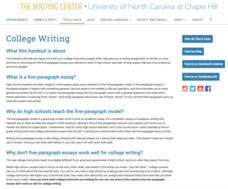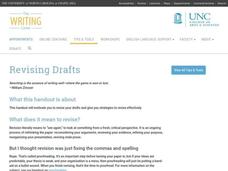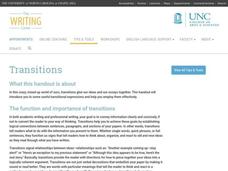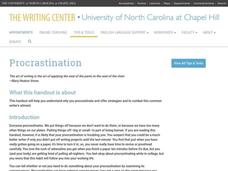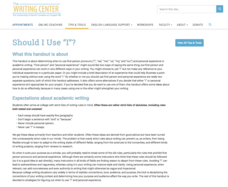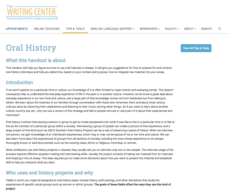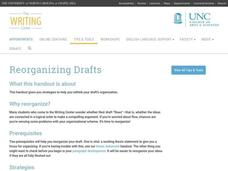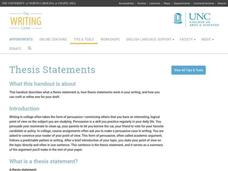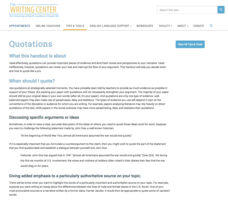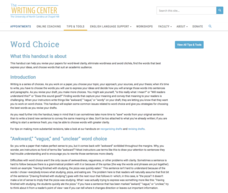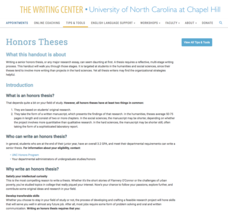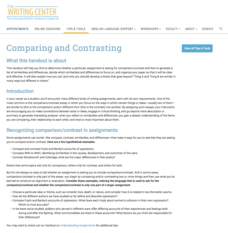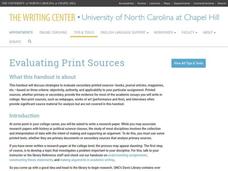University of North Carolina
College Writing
No matter how difficult high school writing may seem, college writing presents challenges of its own. The fourth in a series of 24 handouts from The Writing Center at UNC breaks down the expectations for college writing. Scholars learn...
University of North Carolina
Revising Drafts
Don't simply proofread ... revise instead! Revising drafts is the topic of the 17th handout in UNC's Writing the Paper series of 24 lessons. Writers discover the importance of revision, as well as steps to follow during the process.
University of North Carolina
Essay Exams
For decades, the sight of blue books has struck fear in the hearts of collegians. Those books usually signal an essay exam, the topic of one of the handouts in a larger series on specific writing assignments. Using the handout, writers...
University of North Carolina
Transitions
Ideas don't naturally flow from one to another. They need transitions to help them connect. Part of a larger Writing the Paper series, the resource introduces writers to the concept of using transitions in their writing. Topics covered...
University of North Carolina
Verb Tenses
Twelve categories of verbs exist in the future tense, ranging from simple present to future perfect progressive, but only three have a place in academic writing. Those three tenses make up the content of an informational handout that...
University of North Carolina
Procrastination
Inevitably, whenever you give an assignment, at least one person won't start until the last minute. As the 13th handout in the 24-part Writing the Paper series explains, procrastination sometimes brings consequences. It breaks down...
University of North Carolina
Book Reviews
Reading goes beyond taking in information—it also involves forming impressions about what we read. Sometimes we share those impressions through book reviews, a specific type of writing outlined in a handout on the topic. Using the...
University of North Carolina
Should I Use “I”?
Despite the formal nature of academic writing, personal pronouns frequently appear in high school and college papers. While your first instinct may be to cross them out, sometimes it's okay to use them, an idea covered in a handout that...
University of North Carolina
Oral History
There's no better way to learn something than to hear it straight from the horse's mouth. A handout on oral history, part of a larger series on specific writing assignments, explains how to conduct interviews and use the information...
University of North Carolina
Audience
Challenging pupils' perspectives by having them walk in the shoes of the reader. An informative resource discusses how to identify an audience and anticipate their needs before writing an upcoming argumentative essay.
University of North Carolina
Reorganizing Drafts
Poor organization often destroys an otherwise good paper. After writing a first draft, individuals consider the organization of ideas, a topic discussed in the 16th handout in the 24-part Writing the Paper series. The resource covers...
University of North Carolina
Thesis Statements
Phrases such as "This paper is going to be about" and "I am going to tell you about" do not make for effective thesis statements. A handout from the UNC Writing Center helps writers break from those phrases to craft effective thesis...
University of North Carolina
Quotations
According to A.A. Milne, "[A] quotation is a handy thing to have about, saving one the trouble of thinking for oneself." However, as part of a larger series of handouts discusses, quotations also have the ability to enhance a piece of...
University of North Carolina
Word Choice
Words matter, particularly in academic writing. Issues such as vague language, wordiness, and cliches make it difficult to get a point across. Part of a larger series to improve writing skills, the handout on word choice shows writers...
University of North Carolina
Honors Theses
For those enrolled in a college honors program, four years of hard work culminate in one paper—an honors thesis. A handout outlines the steps to writing the paper, beginning with a sample timetable and time management instructions. Once...
University of North Carolina
Comparing and Contrasting
Not all compare and contrast assignments have writers compare and contrast in the same way. Some only ask for comparisons, others only ask for contrasts, and many require more focus than a simple list of similarities and differences....
University of North Carolina
Summary: Using it Wisely
Sometimes summarizing keeps a writer from going deeper into their analysis—don't fall into that trap. Learn the difference between summarizing and analyzing using an insightful resource. Focusing on introductions, the lesson shares...
University of North Carolina
Evaluating Print Sources
Not all sources are created equal, so how do you evaluate them? Writers learn how to evaluate print sources based on elements such as audience, tone, and argument in the sixth handout of 24 in the Writing the Paper series from the...
University of North Carolina
Policy Brief
Not all writing assignments take the form of an essay. When it comes to politics, it's all about policy briefs. This type of writing is the topic of an informative handout, which is part of a larger series on specific writing...
Other
Grays Harbor College: Writing Essays: Four Tips
This resource explores four tips for writers: "Center Your Thinking," "Organize Your Thinking," "Specify Your Thoughts," and "Present Your Thoughts Clearly." The information is presented in an easy-to-follow outline with examples given...
Sophia Learning
Sophia: Argumentative Essays
This tutorial focuses on argumentative essays, longer writings on a well-researched topic with the writer arguing one side of the topic, free of fallacies, and providing several claims. A short YouTube clip of Monty Python shows the...
LD Online
Ld Online: Teaching Expressive Writing to Ld Students
Author provides a research-based instructional essay on three components that consistently led to improved outcomes: adhering to a basic framework, teaching critical steps in the writing process, and providing feedback.
Other
Glendale College: Structure of the Five Paragraph Essay
This website from the Glendale Community College shows the structure of five paragraph essays and the elements within the paragraphs (motivator, thesis sentence, topic sentence, specific support, reworded thesis, clincher). Gives...
Joe Landsberger
Study Guides & Strategies: Writing Basics
This site by University of St. Thomas focuses on the basics for writing any paragraph. It is developed in outline fashion and is very easy to follow. This site provides a basic overview of the process of writing without going into a...
